 ST PATRICK’S Day – that annual celebration of all things Irish – is often synonymous with a certain dark-coloured stout, but a pint of the ‘black stuff’ isn’t the only way pubs and their customers can honour Ireland’s favourite saint.
ST PATRICK’S Day – that annual celebration of all things Irish – is often synonymous with a certain dark-coloured stout, but a pint of the ‘black stuff’ isn’t the only way pubs and their customers can honour Ireland’s favourite saint.
In fact, drinks companies argued that the occasion presents an opportunity to relaunch drinks menus ahead of spring.
And, of course, the Emerald Isle isn’t only known for its stout.
Irish whiskey has earned a reputation for its quality over hundreds of years – and there’s arguably more of it available to Scottish publicans now than at any time in recent history.
“There is little better, in a country that truly understands fine whiskies, than to introduce some of the best Irish Whiskeys available,” said Tina Connolly, global marketing manager in charge of Writers’ Tears Whiskey and The Irishman Whiskey, at Amber Beverage Group.
“This year, 2024, is an especially fine time to be introducing or highlighting Irish whiskeys as it marks the 700th anniversary of Irish whiskey as a category.
“It is therefore an excellent opportunity to promote the heritage of these exceptional spirits.”
While acknowledging the occasion’s ties to ‘all things green’ as well as ‘a certain beer’, Connolly stressed that St Patrick’s Day is actually ‘a celebration of Irish culture and camaraderie and how much our small island nation has captured the imagination of people throughout the world’.
“A certain beer has long been synonymous with this day but with the rise of the Irish whiskey category this is a great opportunity to showcase the depth and breadth of Irish whiskey production and I think menus should reflect that,” she said.
“Ireland produces some great quality mainstream whiskeys that are perfect for simple spirit and mixer drinks where bars can have fun adding colour and garish garnishes.”
Ireland’s whiskey industry has several diversions from Scotch, which pubs and their whiskey-curious customers might want to tap into around St Patrick’s Day.
In addition to blended whiskies, single malt and single grain, Ireland also produces pot still whiskey.
This is whiskey that contains both malted and unmalted barley, which is combined during the mashing process and then distilled in a copper pot still.
In contrast to the vast majority of Scotch whiskies – which are distilled twice – Irish whiskey is distilled three times.
There are also similarities; much like their Scottish brethren, Irish distillers produce a range of mainstream and high-end products to appeal to newcomers and aficionados alike.
“At the top end of the Irish whiskey category, we now also have a range of super and ultra-premium whiskeys that challenge the top whiskies in the world,” said Connolly.
“While I wouldn’t advocate adding green dye to these, you can still make drinks memorable by stamping a shamrock into large cubes of ice to add a St Patrick’s Day twist to a straight serve, add rice paper garnishes to classic cocktails, or pair whiskeys with food such as a traditional Irish Stew.”
Another similarity with Scotch is the growing number of ways Irish whiskey is being enjoyed, from neat or on the rocks to cocktails.
Jody Buchan, business development manager for Speciality Brands in Scotland, said he expects to see a wide range of Irish whiskey serves in pubs and bars this St Patrick’s Day.
“For sure, we’ll expect to see the classics, including the infamous Irish coffee, whiskey and ginger ale and a boilermaker (hauf & hauf serve) – but this doesn’t have to be a stout; discerning imbibers are aware of how versatile whisk(e)y is,” said Buchan.
“There are so many styles and flavours of Irish whiskey, for example Waterford organic has some tropical fruit flavours which pair well with a fruity sour beer or saison.
“(Or) even a measure or two of Drumshanbo in a tall, tropical style drink.”
Similarly, there are a variety of different ways outlets can mark the occasion, from music to menus.
“For example, a traditional pub might go down the live music route, whereas a cocktail bar/restaurant might decide to showcase Irish ingredients in their menus and drinks,” said Buchan.
“One of the beautiful things about the Scottish on-trade is that you’re never short of variety, no matter what town or city you’re in.”



















